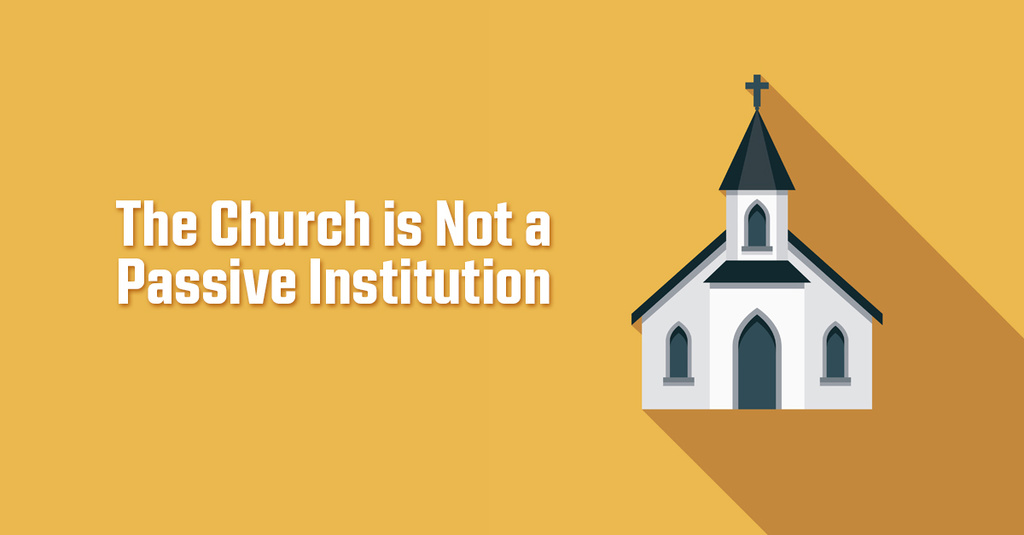
What is the Church?
The definition of Christ’s church is important for several reasons, but for Christian Reconstruction it’s crucial. The authority of Christ places a limit on all institutions, particularly church and state, because His will is the liberty of His people to apply their faith and advance His Kingdom.

- Chalcedon Editorial
The definition of Christ’s church is important for several reasons, but for Christian Reconstruction it’s crucial. The authority of Christ places a limit on all institutions, particularly church and state, because His will is the liberty of His people to apply their faith and advance His Kingdom.
Many Christians today still associate the word church with a building, a Sunday service, or a structured institution with a hierarchy of leadership whether episcopal, presbyterial, or congregational. However, when our Lord spoke of ecclesia, was He referring to a physical structure or a formal organization as we know it today, or was He was describing a people called out to fulfill God’s will on earth?
In a recent episode of the Chalcedon Podcast, Mark Rushdoony, Martin Selbrede, and host, Andrea Schwartz, explored vital truths about what the Bible says about the church, and how believers today can reclaim the original vision of ecclesia with the goal being faithfulness in our generation to advancing Christ’s Kingdom.
The Biblical Idea of the Church
Andrea began the discussion by noting that Jesus only used the word church (ecclesia) twice in the Gospels. The first occurrence is in Matthew 16:18, where Jesus says to Peter, “And I also say to you that you are Peter, and on this rock I will build My church, and the gates of Hades shall not prevail against it.” The second appears in Matthew 18:17, where Jesus instructs His followers on handling disputes: “And if he refuses to hear them, tell it to the church. But if he refuses even to hear the church, let him be to you like a heathen and a tax collector.” Andrea noted that in neither instance did it suggest that Jesus was referring to a central location or a formal institution. Instead, He was speaking about a group of people who would serve as His representatives on earth however they were organized. She posed the question to Mark Rushdoony: “So, Mark, in these two passages, Jesus is not referring to a building. He’s not referring to a hierarchy. Exactly what is He referring to?”
Mark responded by explaining that ecclesia means the called-out ones and is equivalent to the Old Testament assembly of God’s people. He elaborated, “It’s the reference there to the ecclesia as the called-out ones... It’s equivalent to the assembly, the people of the covenant as it was used in the Old Covenant.” He went on to explain that the term ecclesia was not new to Jesus’s audience. It had been in use for centuries in Greek culture, where it referred to an assembly of citizens called together to make decisions for their city-state.
This historical context sheds light on the words of our Lord. He was not speaking of a passive audience or an institution run by a hierarchy—although structure is there—but of an active body entrusted with governing under God’s authority. Mark noted that, “The citizens of a city-state were called out, usually in a time of crisis, where a government had to be renounced or replaced. The people had to take control of the government, so they were called out to an assembly to now reform or change the city in some way.”
This challenges the common assumption that the church is merely a religious institution or identifiable only by its hierarchical structure. Instead, the vision for the church is a governing assembly of God’s people tasked with shaping society according to His law.
How the Church Became an Institution
Andrea then asked how the meaning of ecclesia shifted from a governing assembly to a hierarchical institution. Mark pointed to one reason found particularly in the influence of the King James Version. When King James authorized his translation of the Bible, he required that ecclesia be rendered as “church” rather than “assembly.”
“One of the real unfortunate things about the King James Version... They were ordered to use the word church. Now, the church implies institution,” Mark explained. This translation choice reinforced the idea that the church was primarily an organization rather than a people.
This institutional focus led to hierarchical structures that centralized authority in church leadership rather than equipping believers to govern their own lives under God’s Word. Over time, Protestantism inherited many of the same structural tendencies that had characterized Roman Catholicism. Mark noted that the church began to assume authority that rightly belonged to Christ alone.
Martin added that this shift created a dependency on clergy, where laypeople viewed themselves as passive recipients rather than active participants in God’s Kingdom. The church was no longer seen as a dynamic force for cultural transformation but as a place for religious observance.
The Church as a People, Not a Place
Andrea pointed out that many Christians today still view the church as a physical location, as evidenced by common phrases like “going to church.” She asked whether this reflects a deeper misunderstanding of the church’s nature.
Martin agreed, stating that over time, language has reinforced the misconception that the church is a place rather than a people. He referenced a well-known children’s hand game: “Here is the church, here is the steeple, open the doors and here are the people.” While the game acknowledges that the people are inside, it subtly implies that the church is the building rather than the assembly of believers.
He further explained that this misunderstanding has shaped how churches function today. Many focus on maintaining buildings, fundraising, and providing entertainment-driven services rather than equipping believers to live out their faith in the world. As a result, church attendance has become more about passive participation than about fulfilling Christ’s mission—a mission that is often likened to a spiritual battle. Martin explained, “And this is a mistake because the Church of God, people of God, need to be mustered for a battle, a spiritual battle... The ecclesia is a mustering of a military force, in one sense... I use the spiritual metaphor here, that we are fighting not against flesh and blood, but with spiritual weapons against spiritual enemies.”
Martin reinforced this point by drawing attention to the early church. In the New Testament, believers met in homes and public places. There was no sacred building that housed the church because the church was the people. He emphasized that the shift toward building-focused worship has diminished the biblical understanding of what it means to be part of Christ’s body. He noted, “Once we see the church as a building, then it’s a place to go to, and it’s not really a church unless you’re in the building, as opposed to the church being active most of the time outside the walls of the building. As they say, out of the salt shaker into the world, and we have to have that same emphasis.”
Who Belongs to the Church?
Andrea then asked whether church membership is determined by human approval or by God’s grace. Mark explained that in biblical terms, belonging to the church is based on covenant, not institutional approval.
He pointed to the Old Testament, where covenant membership was marked by circumcision and participation in the Passover. In the New Testament, baptism and the Lord’s Supper serve similar roles. These sacraments signify inclusion in the covenant, but they do not require formal institutional approval.
Mark further noted that just as an infant in ancient Israel was circumcised as a sign of being under the covenant, baptism marks a person’s inclusion in the New Testament church. This does not guarantee salvation, but it places them under the responsibilities of the faith.
Martin added that modern churches often impose additional requirements for membership, treating the church as an exclusive club. Some churches require extensive theological examinations before admitting members, while others establish bureaucratic hurdles that discourage participation. This model contrasts sharply with the New Testament, where believers were recognized as members of Christ’s body based on faith and obedience rather than institutional processes.
Refueling or Reconstruction?
Andrea referenced a Chalcedon publication entitled The Church as God’s Armory and asked how this perspective differs from the modern view of church as a place for spiritual “refueling.” Mark highlighted the fact that as the congregation of the Lord, we are “here to do the Lord’s work, and that even the term Lord implies that there is a kingdom.” He continued, “We’re not just members of Christ, but we’re members of Christ in the role as Lord of His Kingdom. Therefore, we have Kingdom duties... and we have a purpose, a role—the most obvious one is to obey the Lord and to make sure that His will is done and not our own.”
No doubt, the modern tendency is to view the church as a place to receive encouragement before returning to normal life. Contrasted to this, Martin pointed out that in early American history, sermons would often last for hours because people understood the need to be thoroughly equipped in God’s Word. Church was not about entertainment or convenience but about preparation for Kingdom work. Today, many churches have lost that focus, preferring short, non-confrontational messages that appeal to modern sensibilities rather than challenging believers to grow in their faith.
Reclaiming the Biblical Church
As the discussion concluded, Martin emphasized the need to return to a biblical understanding of the church. Jesus did not establish a passive institution but a governing body of believers empowered to advance His Kingdom. Mark highlighted the importance of the diversity of work found in the body of Christ, and Andrea noted that if Christians truly understood what it means to be the ecclesia, their approach to church would change dramatically. Instead of simply attending services, they would see themselves as an active part of God’s work in the world.
By reclaiming this vision, the church can once again become the powerful force that Jesus described—one that the gates of hell will not prevail against.

- Chalcedon Editorial